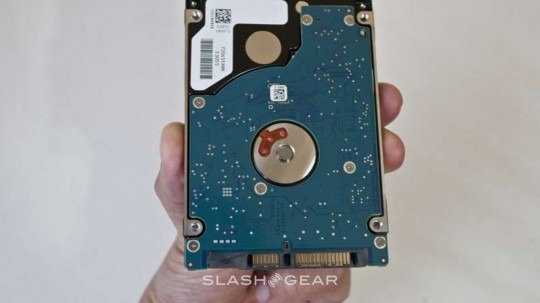Seagate Momentus XT Review
As storage goes, the choices for your new drive have generally been pretty straightforward. On the one side there are traditional HDDs, mechanical drives offering plentiful capacity but with performance and ruggedness compromises; on the other, there are SSDs, which address the speed and sturdiness questions, but are far more expensive per gigabyte. Into the middle comes the Seagate Momentus XT Hybrid, a platter-based HDD paired with flash memory that, the company promises, can give SSD-style performance with the relative low cost of an HDD. Too good to be true? Check out the full SlashGear review after the cut.
Seagate start off with their Momentus 7200 HDD – available in 250GB, 320GB and 500GB capacities – which as the name suggests spins at 7,200rpm; it has 32MB of cache and a SATA 3Gb/s interface. To that they add 4GB of solid state SLC NAND flash storage, all in a 2.5-inch drive that's 9.7mm thick.
Naturally there's more to it than just two types of storage bolted together. Sitting in-between is Seagate's Adaptive Memory technology, which basically tracks which applications and data are most frequently accessed and then moves them to the 4G of flash storage. That way, while not everything is as instantly accessible as on a regular SSD, the files individual users require most often are prioritized.
As a result of that personalization, the benefits of the Momentus XT over a regular hard-drive aren't immediately visible. In fact, out of the box the hybrid drive is in line with the performance of the Momentus 7200 it's based upon, reasonable for a 7,200rpm HDD but well short of a traditional SSD. Over time, though, Adaptive Memory learns which files are being used most frequently, and builds up a custom, persistent cache of them within the flash store. The net result is a system that gradually gets faster the more you use it.
There isn't a long wait to see the effect, either; after a handful of reboots the time it took our test machine to load into Windows 7 was effectively halved. Commonly used programs like Firefox, Photoshop and Word saw their load times almost quartered, while the local cache of our email inbox was available significantly sooner than with a regular HDD. As for basic read/write performance, that's on a par with a regular Momentus 7200 HDD: read speeds averaged out to 94.7 MB/s, while write speeds averaged at 85.4 MB/s.

Although there have been flash-augmented HDDs before, the Seagate is distinct by virtue of its standalone Adaptive Memory technology, which means your PC or Mac simply recognizes the Momentus XT as just another drive; the caching is completely system agnostic. Where the Momentus XT's hybrid technology doesn't work is in situations where you're consistently accessing a changing array of data: obviously the drive needs time to track use and build its cache accordingly. For pure speed – not to mention ruggedness, since there are still spinning platters involved – an SSD is still the best option.
Nonetheless, the Seagate Momentus XT is – for regular users, whether consumer or enterprise – a real step ahead of traditional hard-drives. With a street price of $129.99 for the 500GB ST95005620AS model it offers a strong balance of performance and affordability (for the money you'd get a mere 64GB of true SSD storage), and more impressive is the noticeable difference it makes to a regular system. At a time when boosting RAM or even CPU can lead to merely incremental differences in system responsiveness, the Momentus XT is that rare and surprising product that actually does what's promised on the box.
